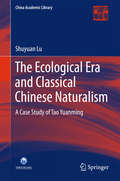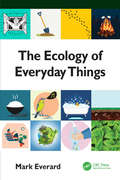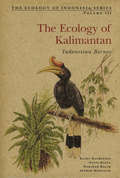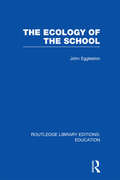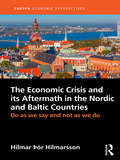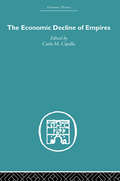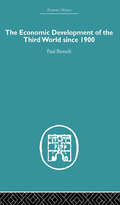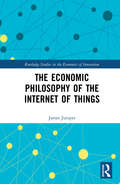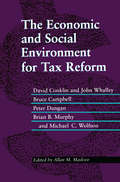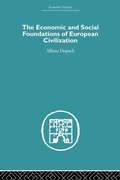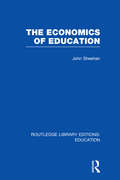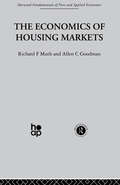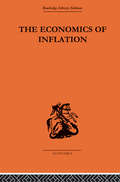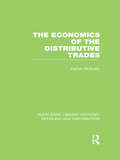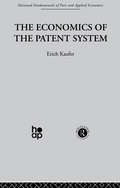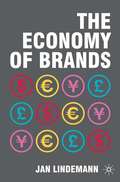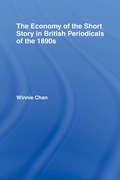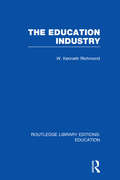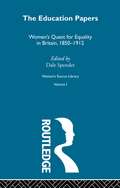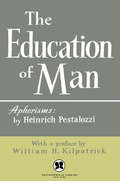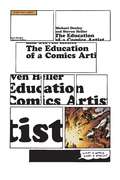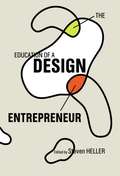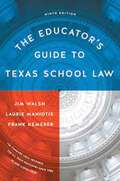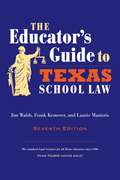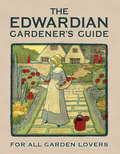- Table View
- List View
The Ecological Era and Classical Chinese Naturalism: A Case Study of Tao Yuanming (China Academic Library)
by Shuyuan LuReflecting the currently growing eco-movement, this book presents to western readers Tao Yuanming, an ancient Chinese poet, as a representative of classical oriental natural philosophy who offered lived experience of “dwelling poetically on earth.” Drawing on Derrida’s specter theory, it interprets Tao Yuanming in a postmodern and eco-critical context, while also exploring his naturalist “kindred spirits” in other countries, so as to urge the people of today to contemplate their own existence and pursuits. The book’s “panoramic” table of contents offers readers a wonderful reading experience.
The Ecology of Everyday Things
by Mark EverardNature is all around us, in the beautiful but also in the unappealing and functional, and from the awe-inspiring to the mundane. It is vital that we learn to see the agency of the natural world in all things that make our lives possible, comfortable and profitable. The Ecology of Everyday Things pulls back the veil of our familiarity on a range of ‘everyday things’ that surround us, and which we perhaps take too much for granted. This key into the magic world of the everyday can enable us to take better account of our common natural inheritance. Professor James Longhurst, Assistant Vice Chancellor, University of the West of England (UWE Bristol) For many people, ecosystems may be a remote concept, yet we eat, drink, breathe and interface with them in every moment of our lives. In this engaging textbook, ecosystems scientist Dr. Mark Everard considers a diversity of ‘everyday things’, including fascinating facts about their ecological origins: from the tea we drink, to the things we wear, read and enjoy, to the ecology of communities and space flight, and the important roles played by germs and ‘unappealing creatures’ such as slugs and wasps. In today’s society, we are so umbilically connected to ecosystems that we fail to notice them, and this oversight blinds us to the unsustainability of everyday life and the industries and policy environment that supports it. The Ecology of Everyday Things takes the reader on an enlightening, fascinating voyage of discovery, all the while soundly rooted in robust science. It will stimulate awareness about how connected we all are to the natural world and its processes, and how important it is to learn to better treat our environment. Ideal for use in undergraduate- and school-level teaching, it will also interest, educate, engage and enthuse a wide range of less technical audiences.
The Ecology of Kalimantan
by Arthur Mangalik Kathy Mackinnon Hakimah Halim Gusti HattaThe Ecology of Kalimantan starts by examining each of the major ecosystems in Kalimantan and the interrelationships of some of the component species. The book takes a look at Bornean peoples, describing their traditional attitudes to and relationships with their forest environment. The book then examines the potential of different land units for the development of artificial production systems such as agricultural cropping, plantations, and agroforestry, and the development options open for forests, wetlands and coastal resources.
The Ecology of the School (Routledge Library Editions: Education)
by John EgglestonWithin a single educational system – that of England and Wales – the nature of schooling available to a child can be dramatically different. Even between residential areas the differences in educational climate can be striking. Apart from differences in the organization of schools and the availability of buildings, teachers and resources, there are also significant ideological variations between local education authorities. This book considers the evidence of such differences, some of the environmental factors (political, social and economic) that may account for their distribution, and the consequences that appear to spring from them.
The Economic Crisis and its Aftermath in the Nordic and Baltic Countries: Do As We Say and Not As We Do (Europa Economic Perspectives)
by Hilmar Þór HilmarssonThe Nordic-Baltic region has become highly integrated. The Nordic countries have been successful in balancing competitiveness and economic growth with social inclusiveness, while the Baltic States have grown economically but remain vulnerable with weak social systems and highly unequal income distribution. European Union (EU) membership and inter-linkages with the continental Nordic banking systems appear to have affected the 2008/09 crisis response of the Baltic States. In spite of their strengths, including their social systems, continental Nordic states are faced with a challenging mix of large, cross-border banks and highly indebted households at a time of rather weak global growth. The Baltic States are challenged by slow economic growth post-crisis, security concerns, and large-scale outward migration of the youngest and most highly educated people. It is now a decade since the Baltic States were hit by the global crisis. It is time to take stock of their progress and assess their relations with other countries in the region and with the EU. This book focuses on the Baltics and their Nordic partners pre- and post-crisis: successes, failures, lessons learned, and future challenges, examining and comparing the crisis response of these various small states that enjoy different income levels, operate different welfare and tax systems, and seek different levels of integration with the EU.
The Economic Decline of Empires
by Carlo M. CipollaThe question of why empires decline and fall has attracted the attention of historians for centuries, but remains fundamentally unsolved. This unique collection is concerned with the purely economic aspects of decline. It can be observed of empires in the process of decline that their economies are generally faltering. Here the similarities in different cases of economic decline are identified, bearing in mind that individual histories are characterized by important elements of originality. In his introduction, Professor Cipolla points out that improvements in standards of living brought about by a rising economy lead to more and more people demanding to share the benefits. Incomes increase and extravagances develop, as new needs begin to replace those which have been satisfied. Prosperity spreads to neighbouring countries, which may become a threat and force the empire into greater military expenditure. For these and other reasons, public consumption in mature empires has a tendency to rise sharply and outstrip productivity and, in general, empires seem to resist change. The ten articles in this collection, first published in 1970, examine separate cases of economic decline, from Rome and Byzantium to the more recent histories of the Dutch and Chinese empires, and demonstrate both the resemblances and the peculiarly individual characteristics of each case.
The Economic Development of the Third World Since 1900
by Paul BairochFirst published in 1967, Professor Bairoch’s Diagnostic de L’Evolution Economique du Tiers-Monde has gone into four editions, and has brought the author an international reputation. This English translation is, in effect, another edition based on the latest French text but incorporating much which is not to be found there. The statistical tables have been revised and expanded wherever possible to include figures up to the end of 1972; the bibliography has been specially adapted to include the literature on the subject in the English language; and two new chapters have been written: Chapter 8 on ‘Urbanization’ and Chapter 9 on ‘The labour force and employment’. It has been Professor Bairoch’s aim in this book to examine the development of under-developed countries (including China) during the present century and through the use of comparative statistics to formulate a diagnosis of their growth. His analysis includes, whenever relevant, a comparison between the present economic progress of Third World countries and that of the developed countries at the time of their ‘take off’. Special attention has also been given to China’s unique path of development. In the course of his research the author has elaborated several new series. The production of these new series and their integration with existing data make this book a valuable quantitative economic history of the Third World.
The Economic Philosophy of the Internet of Things (Routledge Studies in the Economics of Innovation)
by James JuniperTo properly understand the nature of the digital economy we need to investigate the phenomenon of a "ubiquitous computing system" (UCS). As defined by Robin Milner, this notion implies the following characteristics: (i) it will continually make decisions hitherto made by us; (ii) it will be vast, maybe 100 times today’s systems; (iii) it must continually adapt, on-line, to new requirements; and, (iv) individual UCSs will interact with one another. This book argues that neoclassical approaches to modelling economic behaviour based on optimal control by "representative-agents" are ill-suited to a world typified by concurrency, decentralized control, and interaction. To this end, it argues for the development of new, process-based approaches to analysis, modelling, and simulation. The book provides the context—both philosophical and mathematical—for the construction and application of new, rigorous, and meaningful analytical tools. In terms of social theory, it adopts a Post-Cognitivist approach, the elements of which include the nature philosophy of Schelling, Marx’s critique of political economy, Peircean Pragmatism, Whitehead’s process philosophy, and Merleau-Ponty’s phenomenology of the flesh, along with cognitive scientific notions of embodied cognition and neural Darwinism, as well as more questionable notions of artificial intelligence that are encompassed by the rubric of "perception-and-action-without-intelligence".
The Economic and Social Environment for Tax Reform
by Allan M. MasloveMajor economic and social developments that will determine the context for tax reforms in the 1990s are the subject of this volume. They include the globalization of markets, free trade arrangements, changing technology and production processes, macro-economic policies and conditions in Canada, and population growth and changes in demographic structure.
The Economic and Social Foundations of European Civilization
by Alfons DopschThis is a reproduction of a book published before 1923. This book may have occasional imperfections such as missing or blurred pages, poor pictures, errant marks, etc. that were either part of the original artifact, or were introduced by the scanning process. We believe this work is culturally important, and despite the imperfections, have elected to bring it back into print as part of our continuing commitment to the preservation of printed works worldwide. We appreciate your understanding of the imperfections in the preservation process, and hope you enjoy this valuable book.
The Economics of Education (Routledge Library Editions: Education)
by John SheehanThis book is a survey of the principal aspects of the economics of education, such as the demand for education as consumption and as an investment, good education and economic growth, education and manpower needs, and the finance of education. In some cases in recent years, economic theory has been applied to educational problems in order to gain an insight into the workings of the educational system. The result has been a certain amount of confusion and distrust among teachers and educationists: confusion because some theoretical aspects are not easily understood and distrust of the economist’s intrusion into educational policy-making. This book overcomes these problems by making minimal demands on prior knowledge of economics and by emphasizing the limitations of economic analysis applied to policy matters.
The Economics of Housing Markets (Fundamentals Of Pure And Applied Economics Ser. #Vol. 31)
by A. Goodman R. MuthA state of the art overview of theoretical and empirical aspects of housing market research.
The Economics of Inflation: A Study of Currency Depreciation in Post-War Germany, 1914-1923 (Routledge Library Editions)
by Constantino Bresciani-TurroniThe Economics of Inflation provides a comprehensive analysis of economic conditions in Germany under the Great Inflation and discusses inflationary conditions in general. The analysis is supported by extensive statistical material. * For this translation the author thoroughly revised the original work * Includes an appendix on German economic conditions in the years following the monetary reform, 1923-24
The Economics of the Distributive Trades (Routledge Library Editions: Retailing and Distribution)
by Patrick McAnallyFirst published in 1971, The Economics of the Distributive Trades is a comprehensive analysis of all sectors of the British retailing sector, written by the then-head of the Research Department of the John Lewis Partnership. Using economic statistics and modelling, Patrick McAnally examines the the full range of the retailing business, from output to competition, pricing, assortment and transport to location, staff and finance, and in doing so provides an invaluable snapshot of the state of the distributive trades at the end of the Sixties. First published 1971.
The Economics of the Patent System
by E. KauferHow effective are patents for stimulating economic activity? This volume provides an overview of existing national patent systems and suggests a revised system.
The Economy of Brands
by Jan LindemannIn many businesses brands account for the majority of shareholder value. It is crucial to understand how the economy of brands works and can be exploited to create sustainable value. The purpose of this book is to develop and enhance the understanding of the brand as an economic asset, to make better business and investment decisions.
The Economy of the Short Story in British Periodicals of the 1890s (Literary Criticism and Cultural Theory)
by Winnie ChanThis materialist study of the short story’s development in three diverse magazines reveals how, at the dawn of modernism, commercial pressures prompted modernist formal innovation in popular magazines, whilst anti-commercial opacity paradoxically formed the basis of an effective marketing strategy that appealed to elitism. Integrating methods of cultural studies with formal analyses, this study builds upon recent work challenging Andreas Huyssen’s provocative formation, the "great divide" of modernism.
The Education Industry (Routledge Library Editions: Education)
by W Kenneth RichmondIn one sense, education was always a service industry. This book examines the quality as well as the quantity of contemporary education as it answers the following questions: Are we getting value for money? What makes a good teacher? What sort of education do we want? In the UK in the twentieth century education grew while national income did not. Britain devoted more of its resources to education than any other European nation and yet the UK had the largest proportion of children leaving school at 15 and spent more on each university place than the USA. The author argues that far too little attention was paid to cost-effectiveness analysis and planning. He examines Swedish and American examples and concludes that we must seek and employ the common features of modern management – network analysis, operational research and organizational theory. He also argues that traditional education has to come to terms with the mounting pressures of new curricula and new media.
The Education Papers (Women's Source Library #Vol. 1)
by Dale SpenderFirst published in 1987, this volume makes available key documents, giving the contemporary reader a valuble record of women's struggle for eduacation in the nineteenth and early twentieth centuries. All of the women in this collection achieved significant reforms or struggled to change popular prejudices about women's education
The Education of Man
by Heinrich PestalozziAn introduction of this book is given describing Pestalozzi as an educator. In this book Pestalozzi speaks about his thoughts regarding mankind and humanity, the individual, home, the education of man, poverty, justice and liberty, truth and wisdom as well as nature, the World and God. An example, He who bears the interests of humanity in his breast, that man is blessed. Swiss educational reformer. Between 1805 and 1825 he directed the Yverdon Institute (near Neuchtel), which drew pupils and educators (including Friedrich Froebel) from all over Europe. His teaching method emphasized group rather than individual recitation and focused on such participatory activities as drawing, writing, singing, physical exercise, model making, collecting, mapmaking, and field trips. Among his ideas, considered radically innovative at the time, were making allowances for individual differences, grouping students by ability rather than age, and encouraging formal teacher training.
The Education of a Comics Artist: Visual Narrative in Cartoons, Graphic Novels, and Beyond
by Steven Heller Michael DooleyFeaturing essays by, and interviews with, more than sixty professionals, educators, and critics, the book provides an in-depth view of the art, business, and history of comics art. Readers will learn about a wide variety of genres, from editorial cartoons, political comics, and comic strips to graphic novels, superhero sagas, and alternative comics. Other featured topics include the role of comic art in related fields such as animation, design, and illustration; lesson plans by top teachers; and essays on how to thrive and grow as a creative comic artist.
The Education of a Design Entrepreneur (Education Of Ser.)
by Steven HellerNew from the editor of the pioneering EDUCATION OF . . . series, this benchmark collection of fifty essays and interviews provides students and working designers with a firm understanding of the pitfalls and triumphs awaiting the design entrepreneur. Designers recount their motives for setting out on their own and reflect on the degree to which their creative spirit has been satisfied by entrepreneurial freedom -in areas ranging from book, Web site, and home product design to golf course development and entertainment design. Contributors such as Byron Glaser and Sandra Higashi, Eric Zimmerman, Rudy VanderLans, and others reveal that entrepreneurship is not simply a designer's ticket to liberation -it can also be a labyrinth of clerical tasks and manufacturing nightmares. This collection provides candid anecdotes and no-frills advice for any designer ready to brave the trials and rewards of entrepreneurship.
The Educator's Guide to Texas School Law
by Jim Walsh Laurie Maniotis Frank R. KemererMuch has changed in the area of school law since the first edition of The Educator’s Guide was published in 1986. This new ninth edition offers an authoritative source on all major dimensions of Texas school law through the 2017 legislative sessions. <p><p>Intended for educators, school board members, interested attorneys, and taxpayers, the ninth edition explains what the law is and what the implications are for effective school operations. It is designed to help professional educators avoid expensive and time-consuming lawsuits by taking effective preventive action. It is an especially valuable resource for school law courses and staff development sessions. <p><p> The ninth edition begins with a review of the legal structure of the Texas school system, incorporating recent innovative features such as charter schools and districts of innovation. Successive chapters address attendance, the instructional program, service to students with special needs, the rights of public school employees, the role of religion, student discipline, governmental transparency, privacy, parent rights, and the parameters of legal liability for schools and school personnel. The book includes discussion of major federal legislation, such as the Individuals with Disabilities Education Act, the Family Educational Rights and Privacy Act, Section 504 of the Rehabilitation Act of 1973, and the Every Student Succeeds Act. On the state level, the book incorporates new laws pertaining to cyberbullying and inappropriate relationships between students and employees. Key points are illustrated through case law, and a complete index of case citations is included.
The Educator's Guide to Texas School Law (Seventh Edition)
by Frank Kemerer Jim Walsh Laurie ManiotisMuch has changed in the area of school law since the first edition of The Educator's Guide was published in 1986. In this new seventh edition, the authors have streamlined the discussion by pruning older material and weaving in new developments. The result is an authoritative source on all major dimensions of Texas school law that is both well integrated and easy to read. Intended for Texas school personnel, school board members, interested attorneys, and taxpayers, the seventh edition explains what the law is and what the implications are for effective school operations. It is designed to help professional educators avoid expensive and time-consuming lawsuits by taking effective preventive action. It is an especially valuable resource for school law courses and staff development sessions. The seventh edition begins with a review of the legal structure of the Texas school system. Successive chapters address attendance and the instructional program, the education of children with special needs, employment and personnel, expression and associational rights, the role of religion in public schools, student discipline, open meetings and records, privacy, search and seizure, and legal liability under both federal and Texas law. In addition to state law, the book addresses the growing role of the federal government in school operation through such major federal legislation as the Americans with Disabilities Act, the Individuals with Disabilities Education Act, and the No Child Left Behind Act.
The Edwardian Gardener's Guide
by Twigs WayIt is Edwardian England, and a delightful flower garden and fruitful allotment are matters of personal pride, boons for the dinner table, and even 'important acts of local patriotism'. The Edwardian Gardener's Guide selects nuggets of wisdom from the best-selling One & All garden books, originally published in 1913. In these short booklets, the foremost agricultural and horticultural writers of the period revealed fashions in gardening styles, the best seasonal plants, how to enhance food production and now best to lay out adventurous rockeries, ferneries and grottoes. Packed with charming contemporary advertisements and color illustrations, this handbook gives a glimpse of the pre-First World War 'golden era' of British gardening. With an introduction by garden historian, Twigs Way.
